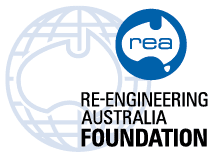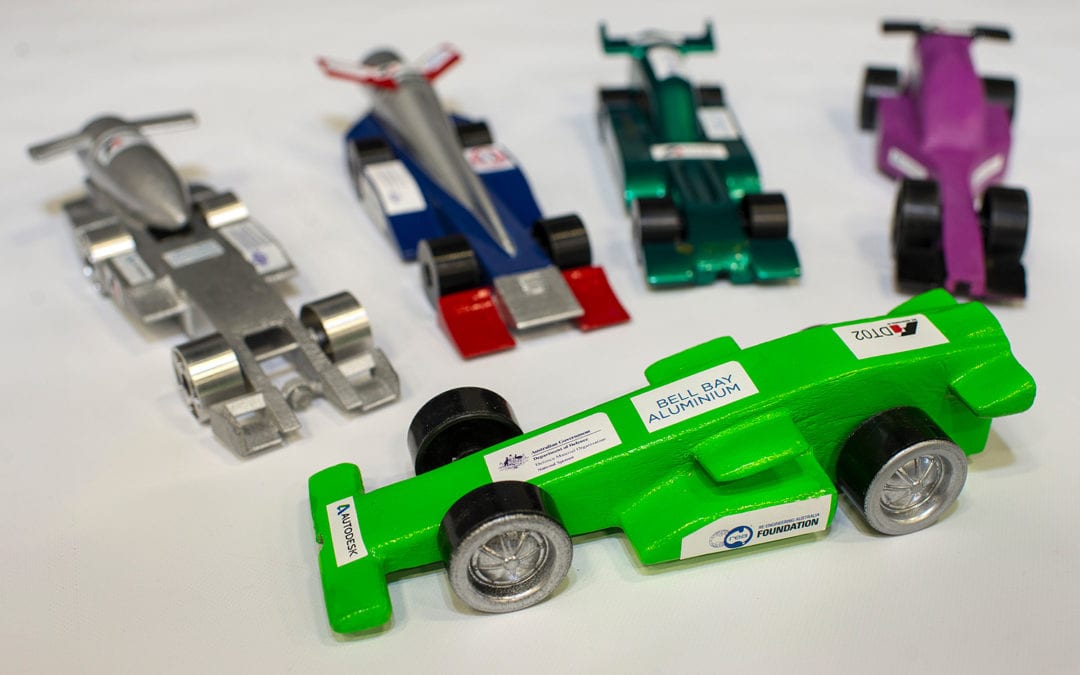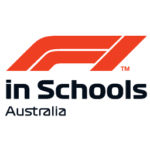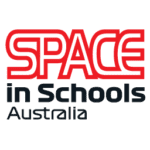Quite apart from being the first aluminium smelter built in the Southern Hemisphere, and contributing $690 million each year to Tasmania’s economy, Bell Bay Aluminium has the unique reputation of having celebrated 10 years of supporting world-class STEM (Science, Technology, Engineering and Mathematics) development in the state’s classrooms.
Bell Bay Aluminium, owned by Pacific Aluminium which is a wholly owned subsidiary of Rio Tinto Limited, has invested more than $300,000 in Tasmania’s education system over the past decade and the student outcomes have been remarkable.
Community Relations Specialist, Louise Clark, explained that this is nothing new for the company,
“Bell Bay Aluminium started production in 1955 and over the past sixty years we have directly supported schools and students across the state investing significantly in a range of educational programs specifically developed to improve school retention rates, literacy and numeracy as well as address skills shortages and develop employability skills.”
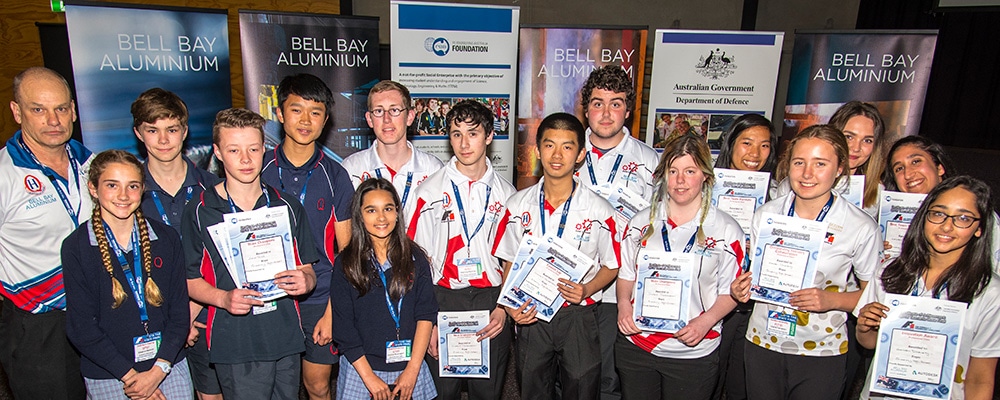
In 2007, the F1inSchools STEM Challenge was introduced to Tasmania and Bell Bay Aluminium immediately became involved,
“It was a longstanding formal partnership between us and the Tasmanian Department of Education (Learning Services North) that introduced this exciting and dynamic program to Tasmanian schools. Bell Bay Aluminium invested $85,000 for a pilot programme which included the State’s first technology hub established at Brooks High School.”
The company was impressed by the track record of this hands-on applied learning program which was managed by not for profit social enterprise, Re-Engineering Australia Foundation. It was based around students forming teams to design, test, make and race futuristic F1 cars using state of the art computer software and manufacturing equipment that some professional engineers didn’t have access to.
The racing and hi-tech’ environment of F1inSchools provided an appeal to students who didn’t believe that “science was cool”, and through it they discovered rewarding career paths and developed ‘soft skills’ sought after by employers.
“Bell Bay Aluminium identified with the aims of the competition to introduce and attract students to the world of engineering design, manufacturing and other related fields. However the competition was not just about the cars, but rather the opportunity to create and test ideas, challenge traditional stereotypes, for students to find out each other’s strengths while solving issues associated with achieving the best performance with their car. The underlying learning was about communication, collaboration, teamwork and innovation – and it was all done in a fun learning environment”, added Louise.
One year later the success of the pilot led to Bell Bay Aluminium making a significant contribution,
“We invested a further $100,000 and established a second technology hub at Newstead College. Some 10 years later those technology hubs are now based at Queechy High School in Launceston and Ulverstone School on the North West Coast.”
Louise said the number of competing teams and schools has fluctuated over the past ten years but Tasmania has certainly seen its fair share of success.
“In 2011 this internationally acclaimed program realised a world champion performance from a local team, The Pentagliders, from Brooks High School. It was so exciting to see Tasmania as the best in the world at STEM. That team included Nathan Clark who secured an apprenticeship at Bell Bay Aluminium and currently works for us as a process maintainer.”
“In 2015, Ulverstone High School’s Ignition team competed at the world final in Singapore as part of a collaboration with students from the United Kingdom, calling themselves Endeavour. Peter Henderson, the team’s engineer from Ulverstone, was selected for the prestigious Williams Ranstad F1 Academy Mentoring Program following the world final.”
“Last year an all-girl Tasmanian team called Golden Diversity just missed out on going to the world finals. They went one place better at this year’s National Finals and are preparing to head off to the world finals in Malaysia which will include visiting the drivers and race engineers at the Malaysian Formula One Grand Prix. We are so proud of their achievements.”
Louise said the National Finals were dominated by Tasmania. The three teams from Queechy High School finished first and third outright, as well as being a finalist in the elimination knockout racing. They claimed 10 major awards and the girls crowned their achievement by setting the fastest lap time.
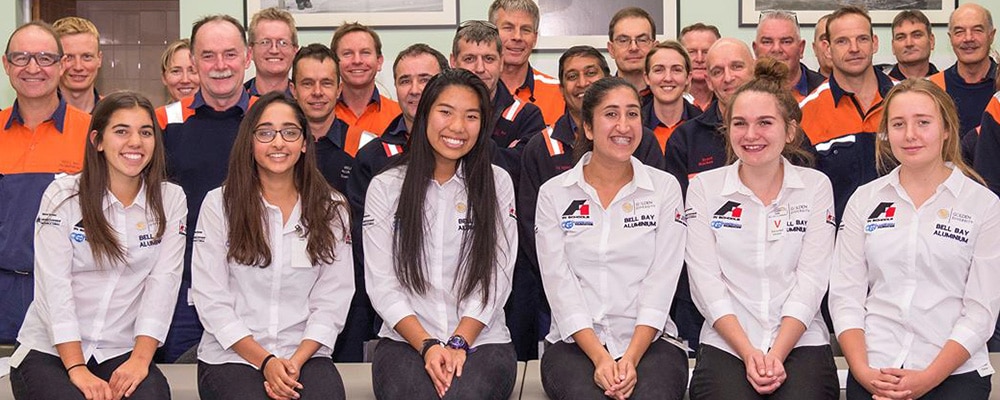
Murat Djakic, the lead teacher who has been largely responsible for the growth of F1inSchools in Tasmania, was recognised for his efforts by being made a Fellow of the Re-Engineering Australia Foundation.
Bell Bay Aluminium was presented with REA’s John Button Memorial Award from Founder and Chief Executive, Dr Michael Myers OAM for their contribution to STEM education over the past 10 years.
“Tasmania’s domination of the program in 2016/2017 is a reflection of the hard work that these students and their teachers have put in to this project”, added Louise, “Bell Bay Aluminium is simply the vehicle that provides the students with the opportunity to achieve great things. We are so excited that Tasmanian students make up almost 50% of Team Australia at the next World Finals.”
Louise added that the future is looking bright for young people in the Apple Isle,
“F1inSchools has the potential to really engage students. Over the past six years, and previously as a judge before I came to work at Bell Bay Aluminium, I have personally witnessed the development of students participating in the program in terms of their self-confidence and self-belief. This program is styled on collaborative learning that is also very prevalent in the workplace these days ensuring that these young people will be very employable into the future.”
“This competition is the largest secondary school technology program in the world and Tasmanian schools now have a strong history of success at a national and international level. We are extremely proud to support this innovative program in Tasmania that engages students in STEM and where students can learn for themselves just how exciting careers in these areas can be.”
